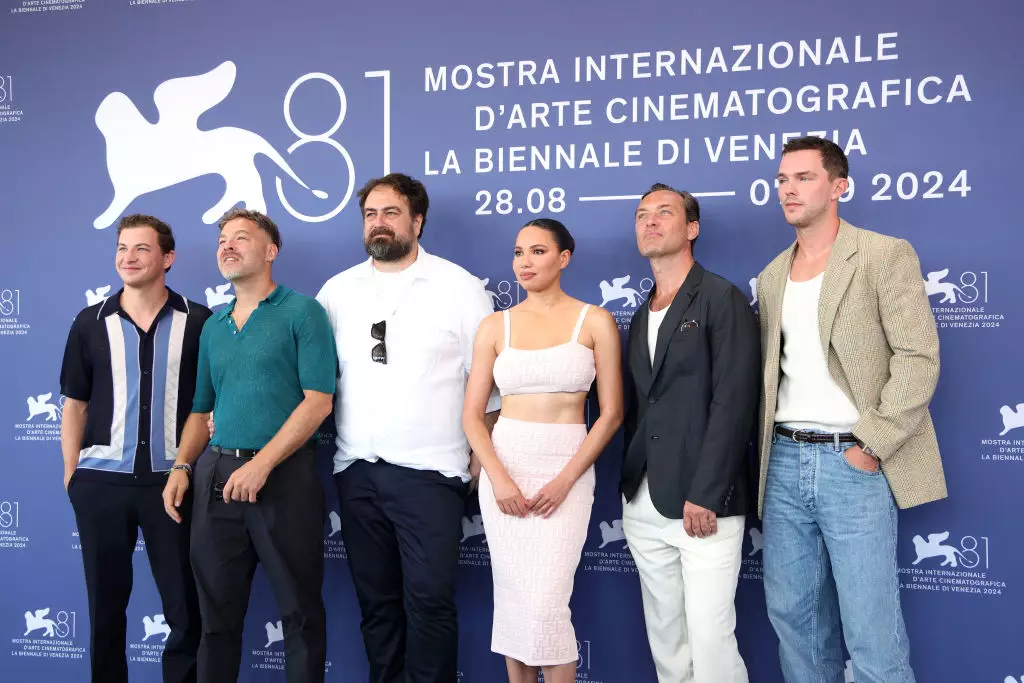The team behind The Order, including Jude Law, Nicholas Hoult, Tye Sheridan, and Jurnee Smollett, recently discussed the crime-drama’s resonance with extremism during a press conference in Venice. The film delves into a series of bank robberies and car heists that terrorized communities in the Pacific Northwest in the 1980s. Law plays a lone FBI agent who suspects that the crimes were not merely financially motivated but the work of a dangerous domestic terrorist group, The Order, led by Hoult. The film portrays the intense battle between law enforcement and the far-right group, showcasing the complexity of the characters and the moral dilemmas they face.
During the press conference, the team was asked about the film’s relevance to the current divided political landscape in the United States. Law emphasized the significance of the film, stating that it felt like a piece of work that needed to be made now. Director Justin Kurzel also chimed in, highlighting how the film reflects the era of division and ideological conflicts that we currently live in. He pointed out that the dangerous ideologies portrayed in the film can quickly take root, especially among those who feel marginalized or unheard. The film serves as a stark reminder of the historical and ongoing issues of bigotry and extremism in America.
Actress Jurnee Smollett touched on the complex history of America and how the film mirrors the dark and ugly sides of society. She emphasized that one of the beauties of art is its ability to hold a mirror up to society and explore the complexities of humanity. By shedding light on the darkness of our history, artists have the power to educate and inspire change. The themes and narratives explored in The Order are not limited to a specific time period but are timeless and universal, transcending borders and cultures.
The crime-thriller, based on the non-fiction book “The Silent Brotherhood” by Kevin Flynn and Gary Gerhardt, was a passion project for director Justin Kurzel. He mentioned that he had been wanting to make an American film for some time, drawing inspiration from classic dramatic thrillers of the 70s. Kurzel’s previous works, such as “Nitram,” “True History Of The Kelly Gang,” “Macbeth,” and “Snowtown,” have established him as a filmmaker unafraid to tackle dark and challenging subject matters. With The Order, Kurzel aims to shine a light on the dangers of extremism and the importance of standing up against injustice.
Vertical is set to release The Order in the U.S. in December, with Amazon Prime Video distributing the film in multiple international markets. The film’s arrival on the global stage is sure to spark discussions about the prevalence of extremism and the role of art in addressing societal issues. As audiences engage with the thought-provoking narrative of The Order, they are encouraged to reflect on the complexities of the human experience and the impact of extremism on individuals and communities alike.
The Order offers a gripping and thought-provoking exploration of extremism, illuminating the dark underbelly of society and challenging viewers to confront uncomfortable truths. Through its compelling characters, timely themes, and powerful storytelling, the film serves as a poignant reminder of the ongoing struggle against hate and division. As we navigate the complexities of our modern world, works of art like The Order provide us with a mirror to reflect on our past, present, and future, inspiring us to strive for a more just and compassionate society.

Leave a Reply